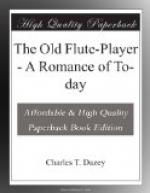“For such as you,” the man replied, maliciously—he was a disappointed, vicious person—“there ever is demand from large and small.”
“Why, then, did you come back to England?” the flute-player inquired.
“I? Oh, I am not an artist—a real artist, as you are,” was the answer, flattering and vicious. The man had tried to get an introduction to fair Anna and had been refused peremptorily, as all had been refused. He planned to have revenge for it. “The man who merely plays is not so vastly better off, there in the states, than here; but to the artist—to the real artist, such as you—the states will literally pay anything.”
That the man who had found failure was not a real musician Kreutzer knew. Too often had his trombone trespassed, with its brazen bray, upon the time which the composer had allotted to the soft, delightful flute, to leave the slightest doubt of its performer’s rank incompetence. That he had failed was, therefore, easily understood; in no way did it indicate that all he said about the chances of a real musician in the land of skyscrapers and mighty distances (which he also told about at length) was of necessity untrue. It had been the talk of this man which had fascinated Kreutzer; it was the city of this man’s wild fancy which the flute-player expected to encounter when he reached New York.
The disillusionment came slowly at the start. Certainly the skyscrapers were existent in a number and a grandeur which the man had not been able to exaggerate; certainly the railway trains ran up and down on iron stilts as he had said they did; certainly the crowds were mighty and amazing both in their brutality and their good nature, just as he had said they were. Many things there were which, for a time, preserved the innocent flute-player’s faith in his informant. But when he came to look for work—ah, then vanished the first bubble. Seemingly there was no place in all the city for an old performer on the flute save that which Karrosch offered and which Kreutzer would not take.
Even in this new land, far from those he would avoid, the old flute-player was determined not to go to the great orchestras, among whose auditors were likely to be travelers. Thus he barred himself from opera-houses, theatres and most of the hotels, by the towering barrier of his own timidity. Nor did he wish to join a union (this shut him out from many smaller orchestras) or even to enroll himself at the employment agencies. He would not risk unwelcome prominence even to that slight extent. Instead of doing these things, which would at once have won him profitable work, he tramped the streets, looking for various employment, at first with a resilient hope, then with a careful industry, at the end of the first month with dogged determination, finally with a desperation bordering upon despair.




